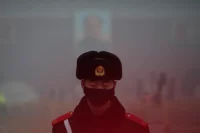
China logró producir autos eléctricos baratos. EE. UU. tiene que intentarlo también
Pasó muy rápido, tan rápido que tal vez no lo hayas notado. En los últimos meses, los tres grandes fabricantes de automóviles de Estados Unidos —Ford, General Motors y Stellantis, la empresa del nombre peculiar que es propietaria de Dodge, Chrysler y Jeep— comenzaron a estar en un gran aprieto.
Sé que esto puede sonar ridículo. Ford, General Motors y Stellantis obtuvieron miles de millones en ganancias el año pasado, incluso después de una larga huelga de trabajadores de la industria automotriz, y las tres empresas prevén un gran 2024. Pero hace poco, los Tres Grandes se vieron superados e imposibilitados de alcanzar sus objetivos de ventas de vehículos eléctricos al mismo tiempo que aparecía una línea de nuevos coches eléctricos extranjeros asequibles, listos para inundar el mercado mundial.… Seguir leyendo »















